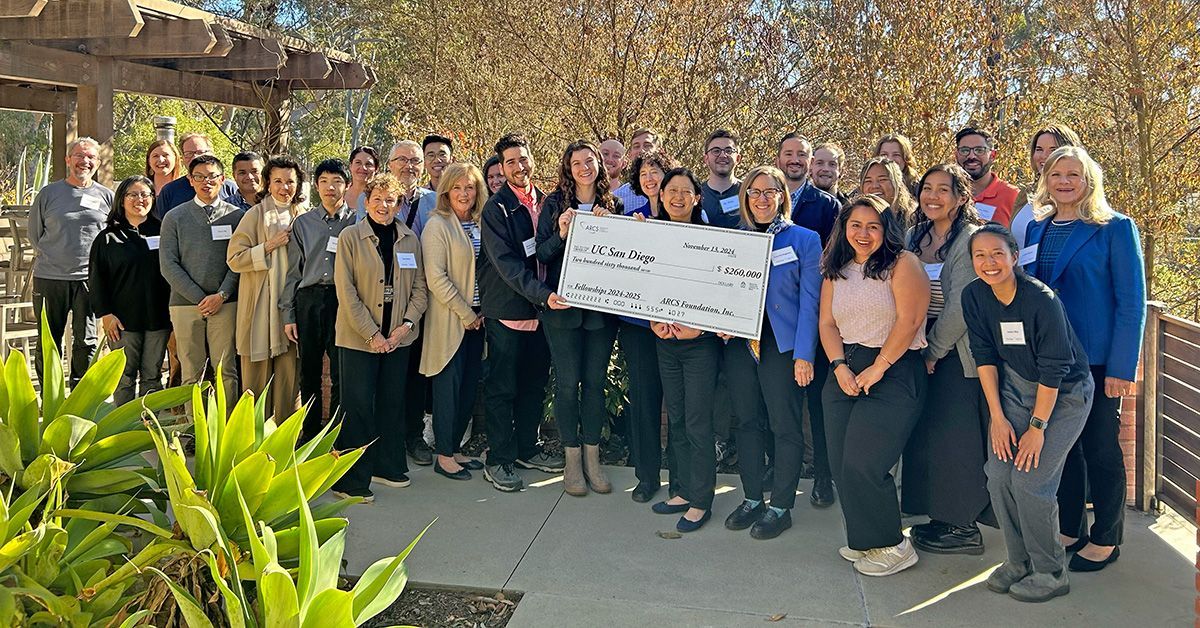ARCS Foundation Awards $260,000 to UC San Diego Graduate Students
On Nov. 13, members of the ARCS San Diego chapter presented a check to support 26 new and returning graduate students for the 2024-25 academic year.
Story by:
Published Date
Article Content
University of California San Diego sixth-year PhD candidate Chiaki Santiago’s passion for understanding the brain sparked at a young age. During summers in Japan, she worked on her family’s rice paddy farm, learning the skills needed for harvest. She marveled at how her family members moved through the process easily as if the tools were extensions of their bodies. This piqued her curiosity: how does the brain learn and adapt skills?
These questions led Santiago to pursue a career in neuroscience, beginning with a bachelor’s degree from Vanderbilt University and continuing her studies in Brenda Bloodgood’s lab at UC San Diego. Today, she investigates the role of neuronal PAS domain protein 4 (NPAS4), which regulates gene expression. By understanding NPAS4’s function in healthy neural circuits, her work could help identify targeted therapies for neurological disorders.
Santiago is one of more than 900 graduate students who have received financial support from the Achievement Rewards for College Scientists (ARCS) Foundation San Diego chapter, established in 1985. On Nov. 13, 2024, members of the ARCS San Diego chapter presented a check for $260,000 to support 26 new and returning graduate students, each awarded a $10,000 unrestricted gift for the 2024-25 academic year. Executive Vice Chancellor Elizabeth Simmons accepted the check at an award reception held at the Ida and Cecil Green Faculty Club.
Founded in 1958, the ARCS Foundation is a national nonprofit led entirely by women that aims to advance scientific innovation in the United States by supporting undergraduate and graduate scholars who are U.S. citizens in the STEM fields. ARCS awards are unrestricted grants that scholars can use in any way to advance their academic progress or research program. San Diego is one of 15 ARCS Foundation chapters.
“This generous donation from the ARCS Foundation enables our brilliant graduate students to focus their efforts on their groundbreaking research that is pushing the boundaries of scientific knowledge,” shared UC San Diego Division of Graduate Education and Postdoctoral Affairs Director of Professional Development and Fellowships Giulia Hoffmann. “The foundation also serves as a vital connection point for our scholars to a large network of fellow scientists. We are deeply grateful to ARCS for supporting our students.”
The 2024-25 UC San Diego ARCS Scholars are pursuing industries ranging from public health and clinical psychology to structural engineering and biochemistry.
“The ARCS Foundation’s support has been instrumental on my journey,” Santiago shared. “Graduate school, especially in San Diego, is financially challenging, and financial strain can force some students—disproportionately from marginalized backgrounds—to leave their programs. The funding from ARCS helps alleviate that pressure, making it possible for students from all backgrounds to contribute to and enrich the scientific community.”
ARCS also introduced Santiago to a community fueled by curiosity and a shared mission to advance knowledge. “My mentor, Elizabeth Taft, has been a guiding light, and her genuine interest and engagement have sparked new ways of thinking about my work. Even the smallest questions or perspectives from this community have challenged and expanded my understanding, shaping both my research and personal growth.”
Through ARCS, she has also connected with a bevy of passionate scholars from a wide range of scientific fields. “This interdisciplinary network has been invaluable,” she said. “They have encouraged me to think beyond the lab and consider the broader impact of our work.”
For more information about the ARCS Foundation, visit san-diego.arcsfoundation.org.
 LEARN MORE ABOUT HOW YOU CAN SUPPORT UC SAN DIEGO »
LEARN MORE ABOUT HOW YOU CAN SUPPORT UC SAN DIEGO »
"The funding from ARCS...[makes] it possible for students from all backgrounds to contribute to and enrich the scientific community.”
Share This:
Stay in the Know
Keep up with all the latest from UC San Diego. Subscribe to the newsletter today.




